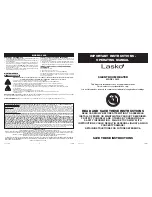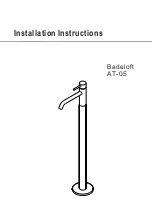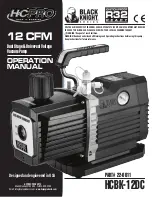
7
THERMOMETERS (Not Supplied)
Thermometers should be obtained and field installed.
Thermometers are installed in the system as a means of detecting
the temperature of the outlet water supply.
This Water Heater has been design certified as complying with
ANSI Z21.10.3-CSA 4.3 current edition for water heaters and is
considered suitable for:
Water (Potable) Heating and Space Heating: All models are
considered suitable for water (potable) heating and space heating.
HOTTER WATER CAN SCALD:
Water heaters are intended to produce hot water. Water heated to a
temperature which will satisfy space heating, clothes washing, dish
washing, and other sanitizing needs can scald and permanently injure
you upon contact. Some people are more likely to be permanently
injured by hot water than others. These include the elderly, children,
the infirm, or physically/mentally handicapped. If anyone using hot
water in your home fits into one of these groups or if there is a local
code requiring a certain temperature water at the hot water tap, then
you must take special precautions. In addition to using the lowest
possible temperature setting that satisfies your hot water needs,
a means such as a *Mixing Valve should be used at the hot water
taps used by these people or at the water heater. Mixing valves are
available at plumbing supply or hardware stores. Consult a qualified
installer or service technician. Follow mixing valve manufacturer’s
instructions for installation of valves. Before changing the factory
setting on the thermostat, read the “Temperature Regulation” section
in this manual, see Figures 17 and 18.
FACTS TO CONSIDER ABOUT THE LOCATION
Carefully choose an indoor location for the new water heater,
because the placement is a very important consideration for
the safety of the occupants in the building and for the most
economical use of the water heater. This water heater is not
for use in manufactured (mobile) homes or outdoor installation.
Whether replacing an old water heater or putting the water heater
in a new location, the following critical points must be observed:
1. Select a location indoors as close as practical to the gas vent or
chimney to which the water heater vent is going to be connected,
and as centralized with the water piping system as possible.
2. Selected location must provide adequate clearances for
servicing and proper operation of the water heater.
Installation of water heater must be accomplished in such a manner that
if the tank or any connections should leak, flow will not cause damage to
the structure. For this reason, it is not advisable to install water heater
in an attic or upper floor. When such locations cannot be avoided, a
suitable metal drain pan should be installed under the water heater.
Metal Drain pans are available at your local hardware store. Such a
metal drain pan must have a minimum length and width of at least
2” (51 mm) greater than water heater dimensions and must be piped
to an adequate drain. The pan must not restrict combustion air flow.
Water heater life depends upon water quality, water pressure and the
environment in which the water heater is installed. Water heaters are
sometimes installed in locations where leakage may result in property
damage, even with the use of a drain pan piped to a drain. However,
unanticipated damage can be reduced or prevented by a leak detector
or water shut-off device used in conjunction with a piped drain pan.
These devices are available from some plumbing supply wholesalers
and retailers, and detect and react to leakage in various ways:
• Sensors mounted in the drain pan that trigger an alarm or turn off
the incoming water to the water heater when leakage is detected.
• Sensors mounted in the drain pan that turn off the water supply
to the entire home when water is detected in the drain pan.
• Water supply shut-off devices that activate based on the water
pressure differential between the cold water and hot water pipes
connected to the water heater.
• Devices that will turn off the gas supply to a gas water heater
while at the same time shutting off its water supply
.
INSTALLATIONS IN AREAS WHERE FLAMMABLE LIQUIDS
(VAPORS) ARE LIKELY TO BE PRESENT OR STORED (GARAGES,
STORAGE AND UTILITY AREAS, ETC.): Flammable liquids (such as
gasoline, solvents, propane [LP or butane, etc.] and other substances
such as adhesives, etc.) emit flammable vapors which can be ignited by
a gas water heater’s pilot light or main burner. The resulting flashback
and fire can cause death or serious burns to anyone in the area, as well
as property damage. If installation in such areas is your only option, then
installation must be accomplished in a way that the pilot flame and main
burner flame are elevated from floor at least 18 inches. While this may
reduce chances of flammable vapors, from a floor spill being ignited,
gasoline and other flammable substances should never be stored or








































